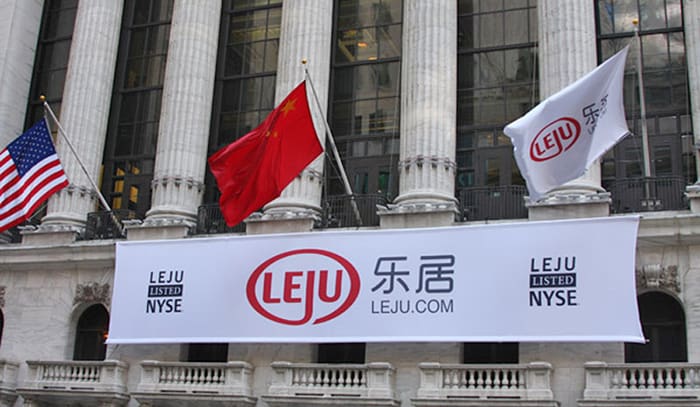
Leju had listed on the NYSE in 2014
Internet giant Alibaba is making its latest attempt to port its e-commerce dominance into China’s real estate market as the Hangzhou-based firm ups its stake in one of the mainland’s largest real estate agencies.
E-House (China) Enterprise Holdings Limited (02048.HK), a Chinese real estate services company, announced on 31 July that it will allocate 118.3 million shares to Alibaba (NYSE: BABA) for a total consideration of HK$828.1 million ($107 million), increasing the tech titan’s stake in the Shanghai-based agency from 1.97 percent to approximately 8.32 percent.
The share purchase is part of a two-tranche investment by Alibaba in E-House, and is linked to separate transaction through which E-House will buy back control of Leju.com by purchasing a 56 percent stake in the NYSE-listed property listings website, making it once again a subsidiary of the property agency.
Stocks and Bonds
Alongside the stock purchase, Alibaba will invest HK$1.03 billion to purchase three-year convertible notes issued by E-House at a price of HK$10.37 per share. E-House shares were priced at HK$11.20 per share when the market closed on Friday — the day that the deal was announced.

E-House chairman Zhou Xin has some new friends with deep pockets
Should Alibaba convert all of the financial instruments in addition to its recent share price, it would hold a 13.26 percent stake in E-House, making it the second largest shareholder in the company after founder and chairman Zhou Xin.
As part of the agreement, Alibaba and E-House plan to cooperate in launching a joint venture real estate marketing and online transaction platform with E-House taking responsibility for online deals, and the company’s Leju unit driving digital marketing efforts. The two companies are set to invest RMB 5 billion in the web service provider with Alibaba holding an 85 percent stake and E-House the remaining 15 percent of the JV, according to local media reports.
Buying Back Listings Platform
Separately, E-House will also acquire an aggregate 56.19 percent stake in Leju (NYSE:LEJU), making the mainland property listings and marketing platform once again a unit of the real estate agency.
“The cooperation between E-House and Alibaba is not only a key milestone in E-House’s and Leju’s development, but also a significant event in China’s real estate service industry,” said Leju and E-House chairman Zhou Xin in a press release. ”In the process of collaborating with E-House and Alibaba to build an online real estate marketing and transaction platform, Leju will leverage its experience in online marketing and transaction service and become the service provider for digital marketing and operation on the platform,” he added.
Zhou also said that he expects the joint effort with Alibaba to improve Leju’s competitiveness, with the site have long ranked as an also-ran among mainland real estate media.
Under the terms of the all-stock deal E-House will purchase 49.7 million ordinary shares and 2,2 million ADSs (each representing one ordinary share) of Leju from entities related to Zhou Xin in return for 167 million shares in E-House.
E-House will also be purchasing 24.4 million ordinary shares and 36,687 ADSs in the listings website from entities controlled by Chinese Internet giant Sina in return for 78.7 million E-House shares.
In its 2019 annual report Leju indicated that Zhou Xin owned 52.1 million shares in Leju, equivalent to 38.3 percent of the company’s equity, while Sina had 42.1 million shares to maintain a 31.0 percent holding.
At the end of 2019 E-House held a 35.2 percent stake in Leju, which barring other trades by company would now give the agency a 91.39 percent holding in the property listings platform, making it once again a subsidiary after E-House had spun the company off through an NYSE IPO in 2014.
Online Giants Fight Offline Battle
One of the country’s biggest real estate services firms with a market capitalization of HK$16.18 billion, E-House has been developing a relationship with Alibaba since the e-commerce firm took a cornerstone stake in the agency’s Hong Kong IPO two years ago.
The recent online-offline alliance between two companies came only a week after Tencent-backed Beike submitted its IPO application to the New York Stock Exchange and attempted a $1 billion IPO, aiming for what would be the largest US listing of a Chinese company in more than two years.
According to Beike’s prospectus, Tencent, which is Alibaba’s biggest competitor in China’s Internet sector, holds 12.3 percent of the company’s equity and ranks as the real estate listings platform’s second largest shareholder after founder and chairman Mr. Zuo Hui. The parent company of WeChat also held a 15.6 percent stake in Leju at the end of 2019.
The mainland Internet giant in real estate is seen as springing from the sector’s outsized role in China, where it is estimated to account for 25 percent of GDP, and the low current level of tech adoption in the industry.
“Alibaba and Tencent are huge in scale, and they must continue to get involved in new businesses to fill the gap and maintain high-speed growth,” said Meng Shen, a director at boutique Beijing investment bank Chanson & Co. “After receiving their respective financial support, Alibaba-backed E-House and Tencent-backed Beike will directly compete in the field of real estate transaction services.”
Beike commenced operations in 2001 through Beijing Lianjia, a Beijing-based real estate brokerage which operates over 42,000 agency locations across 103 mainland cities. In 2019, it recorded 2.2 million transactions and about 39 million mobile monthly active users allowing it to handle a gross transaction value of approximately RMB 2.1 trillion ($300 billion).
The coincidence of China’s two largest Internet firms announcing real estate platform initiatives within a few weeks time is also seen as symbolising the limited options available for cashed-up companies to invest in high growth opportunities on the mainland.
“Alibaba’s reported partnership with E-house illustrates that Chinese investment capital may still be chasing a paucity of innovative investment themes and ideas, said Brock Silvers, CIO of Adamas Asset Management in Hong Kong, “Although if the Beike IPO isn’t completed for any reason, perhaps that opens the field somewhat for another presumably deep-pocketed player like Alibaba and E-house.”
Alibaba Chases Real Estate
Amid weaker economic growth and tighter market controls in China, Chanson & Co’s Meng anticipates growing opportunities for companies to profit by facilitating property deals. “As the industry leader of Internet services, Alibaba could empower E-House with its financial strength while E-House could leverage its expertise so as to strengthen Alibaba’s muscles in the real estate sector and upgrade its Internet business, which could be a win-win game,” Meng said.
According to its annual report, E-House’s revenue amounted to RMB 977.7 million in 2019, representing a year-to-year increase of 26.4 percent, while profit totalled RMB 231.7 million — up 7.8 percent from 2018.
But Alibaba also has reason to be cautious as it continues to look for ways to leverage its online power and cash resources in offline commerce.
Last May Jack Ma’s innovation giant paid just less than HK$2.7 billion to take control of China’s second-largest commercial developer, Red Star Macalline from Warburg Pincus. The e-commerce giant also purchased RMB 4.36 billion of convertible bonds issued by Red Star Macalline Holding Group Company in an effort build up the home furniture mall operator’s business.
By June of this year Red Star Macalline was selling RMB 4 billion in new shares after having built up RMB 12.93 billion in short term debts against available cash of RMB 8.06 billion.
In April, Fitch downgraded Red Star Macalline to BB+, which reflects the American credit ratings agency’s prediction that Red Star’s financial profile will deteriorate in response to disruption from the coronavirus outbreak and uncertainties surrounding recovery of China’s economy.
Leave a Reply